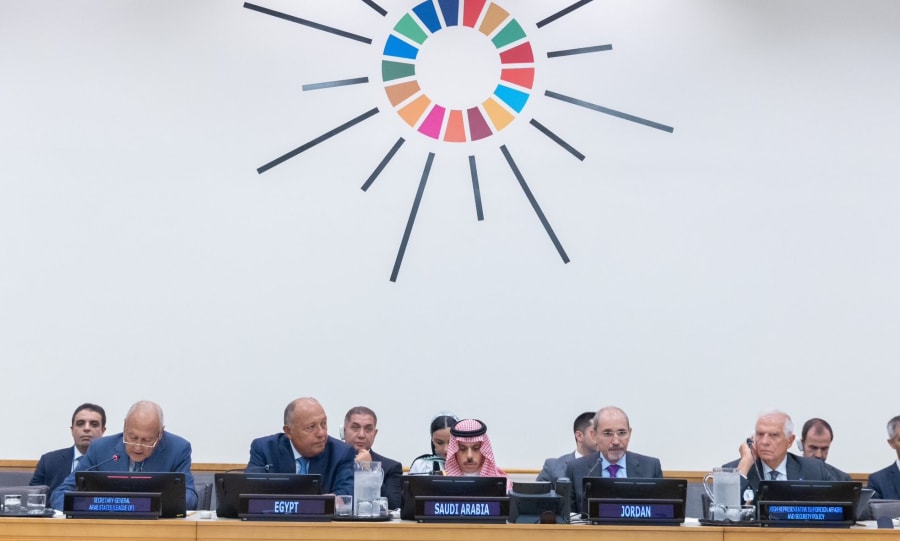EU, Arab nations seek to revive Israel-PA peace process at UNGA
New peace initiative is reportedly '100% carrots'

Top diplomats from some 30 European and Arab nations gathered at the United Nations General Assembly on Monday to present the “Peace Day Effort," a new diplomatic initiative designed to revive the long-frozen peace process between Israel and the Palestinian Authority.
The European Union is leading the new peace effort alongside Saudi Arabia, the Arab League, Jordan and Egypt. Given the protracted nature of the conflict and a history of many failed initiatives, some are skeptical about whether or not the new peace effort will be successful.
However, while past initiatives used a mix of carrots and sticks, the new peace initiative is reportedly “100% carrots” according to Sven Koopmans, EU special representative for the Middle East Peace Process.
“This particular effort is 100% carrots. But that doesn’t mean that everything in EU policy is just that,” Koopmans told the Times of Israel.
The senior EU official said European and Arab contributors are “envisaging… what regionally and globally everybody would contribute the moment that there is an Israeli-Palestinian agreement.”
“What we are now starting to do is to say, ‘If you reach that agreement… this is what we would contribute as your neighbors, as your friends and potential future friends to your peace,” said Koopmans.
Given the complexity of the conflict, the European-Arab diplomatic initiative will establish three working groups that will be tasked with handling a diverse set of issues, such as economic cooperation, security coordination and humanitarian matters.
Koopmans said he hopes the Peace Day Effort will stimulate a debate on both sides about how they envision an end to the protracted conflict.
“With this effort, we hope to make a contribution to that debate,” the EU special envoy said.
This year marks 30 years since Israel and the Palestinian Authority (PA) signed the Oslo Peace Accords at the White House in September 1993. Recently declassified cabinet meeting protocols revealed that 16 out of 18 Israeli ministers voted in favor of the Oslo Accords, which divided Israeli society. While imminent peace is unlikely given the current political deadlock, a significant number of people on both sides reluctantly accept that their respective maximalist goals are no longer realistic.
While the Netanyahu government would likely prefer to maintain the status quo when it comes to the PA, a potential Saudi-Israeli normalization deal could potentially change that equation.
Saudi Arabian Foreign Minister Faisal bin Farhan stressed that a major goal of the new European-Arab peace initiative is to “restore hope” for a two-state solution among the Arab population in the West Bank and the Gaza Strip.
The Saudi Kingdom has increasingly indicated that a Saudi-Israeli diplomatic breakthrough would require Israel to make concessions to the PA. Israeli and American officials recently dismissed unconfirmed media reports that Saudi Arabia froze normalization talks with Israel due to Jerusalem’s unwillingness to make those concessions.
Traditional peace efforts in the Middle East have historically focused on the relationship between Israel and the PA.
According to conventional diplomatic thinking, no progress between Israel and the wider Arab world is possible without a peace agreement between Israel and the PA.
However, the historic American-brokered Abraham Accords, signed in 2020, seriously challenged this policy after the Jewish state normalized ties with four Arab nations – the United Arab Emirates, Bahrain, Sudan and Morocco – despite ongoing tensions and conflict between Jerusalem and Ramallah.
Netanyahu, who played an instrumental role in realizing the Abraham Accords, wants to widen the circle of peace to include more Gulf nations, including the regional key player Saudi Arabia.
The Israeli prime minister admitted during a Bloomberg News interview in August that there were still obstacles to Saudi-Israel normalization. However, Netanyahu stressed that peace was ultimately possible if there was sufficient political will to implement it on the ground.
“If there’s political will, there will be a political way to achieve normalization and a formal peace between Israel and Saudi Arabia,” Netanyahu said.

The All Israel News Staff is a team of journalists in Israel.













